Ask an Expert
Planning the right solution requires an understanding of your project's security goals. Let Kingston's experts guide you.
Your web browser is out of date. Update your browser now for better experience on this site. https://browser-update.org/update-browser.html

There are a few characteristics that make the energy sector especially vulnerable to cyber threats, making energy companies a rich target for cybercriminals. Utilities have an ever-increasing attack surface arising from their difficult-to-harden dispersed geographic and third-party supply chain relationships. The energy industry, like most others, has seen an increasing number of cyber-attacks on its intellectual property (IP) and business-critical data. These breaches can have a detrimental effect on organizations with negative press, reputational damage, financial implications, and loss of IPs to competitors. Combine this with regulations like GDPR and potential financial fines as a result of breaches. For all organizations, ensuring all endpoints are secure and can be audited is so important.
A leading global specialist partner in the energy industry carried out an IT security assessment across their entire device portfolio. The current strategy allowed all employees to access company data and use any storage device they brought in and plug it into their network. The risk to the organization based on the current endpoint device management strategy was very high. Corrective action was therefore required to mitigate further risk of malware or intellectual property being saved on personal storage devices, removed from the organization, being lost, and/or falling into the hands of a competitor, which would be detrimental for the organization. They also reviewed what type of data employees may need access to via portable storage.
They decided that all office-based employees connected to the network could use SharePoint or similar cloud-based sharing tools to save and share data, which was approximately 60% of the work force. The remaining 40% of employees with field-based jobs would need to be able access the company data outside the Wi-Fi network when on site, on oil rigs for example. They would require an easy-to-use encrypted portable device. They needed to ensure that the new solution they rolled out could be approved and managed by their own endpoint management software. The energy industry specialist partner was also looking to set policies so that unauthorized storage devices cannot be used within their network and will be rejected by their endpoint management based.
The mechanical machine sector of the energy industry is quite niche and extremely competitive, so they knew it was important to roll out this new end point management strategy as quickly as possible to mitigate the risk of losing any intellectual properties, such as machine design patents.
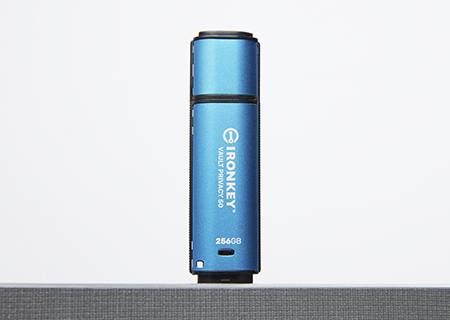
To support the specialist energy industry partner with their request, we offered our free Ask an Expert service. During the initial call, we were able to establish exactly what the organization were trying to achieve with their new endpoint management project. After these meetings/calls, we were able to recommend a potential solution that would enable them to use their current active directory and deploy a user-friendly encrypted USB solution to their field services and engineering teams. It allowed them to have the perfect mix of business-grade security, scale, and cost.
Since one of their key requirements was the ability to provide approved encrypted USB drives to their employees, we achieved this by leveraging one of our customization program’s options to assign custom PIDs (Product ID) unique to their organization. This custom PID allowed their organization to approve this PID with standard end-point management software so that only the Kingston IronKey encrypted USB drives purchased for their organization will function at the endpoints. It means they will have control over what drives could be used within their organization and they had ability to audit all data files downloaded. It also means they will control who is using their end-point management software, protecting the organization’s IP and sensitive data.
By deploying our IronKey Vault Privacy 50 encrypted USB drives, the organization was able to implement a cost-effective user-friendly business-grade security USB drive for sensitive data on the move with AES 256-bit hardware-based encryption in XTS mode.
To support further security, flexibility, and offer peace of mind, the IronKey VP50 supports multi-password (Admin, User, and One-Time Recovery) options with Complex or Passphrase modes. This enhances the ability to recover access to the data if one of the passwords is forgotten. Traditional Complex mode allows for passwords from 6-16 characters using 3 out of 4 character sets. The new Passphrase mode allows for a numeric PIN, sentence, list of words, or even lyrics from 10 to 64 characters long. Admin can enable a User and a One-Time Recovery password or reset the User password to restore data access. Brute force attack protection locks out User or One-Time Recovery passwords upon 10 invalid passwords entered in a row and crypto-erases the drive if the admin password is entered incorrectly 10 times in a row.
This specialist energy industry deployed over 300 Kingston IronKey VP50 encrypted USB drives remotely via mail to their field-based employees in over 30 countries and achieved 100% usage compliance with very positive feedback on ease of use.
As a result, this energy specialist partner is ensuring that their endpoint management policy is more secure by blocking unauthorized USB Flash drives, helping to keep their intellectual property and sensitive date safe on hardware-encrypted drives. This roll-out has also ensured that their organization is complying with regulatory standards.
#KingstonIsWithYou #KingstonIronKey
Was this helpful?

Planning the right solution requires an understanding of your project's security goals. Let Kingston's experts guide you.
No products match your current filter selection. Try adjusting your filters to explore more options.

Looking for improved data security & need to know what is encryption? Kingston covers the basics.

Hardware, not software-based password protection, is the best way to protect files and drives.

Secure important personal and private information on a PC with a hardware encrypted SSD.

Breaches remain a major threat. Explore the need of comprehensive cybersecurity measures.

Here is a list of USB security features to consider for data protection.

Learn what the 3-2-1 data backup method is and why it is your best defense against ransomware.
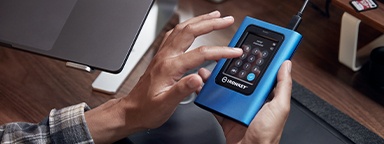
Learn data security best practices with Dr. Vynckier, and the importance of offline backups.

David Clarke covers encryption, superuser safeguards, vulnerability management, and training.

Learn how Kingston IronKey's solutions helped EgoMind enhance their data security hygiene.

The differences between SSD classes lies in two components; the processor and the NAND memory.

We discuss NIS2 and DORA, and how organizations can turn compliance into an opportunity.

We discuss the shifts in how organizations are storing and encrypting sensitive data.

Kingston examines how to secure sensitive files with the increasing vulnerability of email.

Learn how Kingston IronKey hardware-encrypted solutions supports NIS2 Directive compliance.

Kingston IronKey has hardware options to protect small and medium businesses against cybercrime.

FIPS 140-3 Level 3 is certified by the world-leading agency NIST as the apex of encryption.

Questions to ask when seeking the right SSD for your organization’s data center.

Our infographic showcases the differences between software and hardware-based encryption.

2023 has been a year full of challenges and innovations. But what will 2024 bring?

Learn about two methods that give SMBs superior resilience vs. ransomware: encryption & backups.

In this whitepaper, we explain how to enforce a DLP strategy, while allowing USB drive use.

Enterprise-grade and military-grade digital security: two high standards with different requirements.
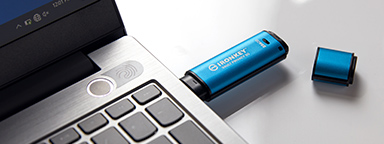
Learn how hardware encryption can protect a travelling lawyer’s confidentiality with secure file storage.

How is pen testing ensuring Kingston IronKey USB drives lead the way in trusted data security?

Hardware-encrypted Kingston IronKey drives protects organizations’ data on the move.

Bring Your Own Device (BYOD) policy is tricky for employers. How to balance security & convenience?

How do encrypted drives improve cybersecurity and compliance for finance companies? Kingston explains.

DLP offers tools for network admins to protect sensitive data from cybercrime and negligence.

A look at how the requirement of data encryption can be key to any organization's security strategy.

How can we bolster network security with remote working and international travel so common now?

Invest in encrypted drives so that if they are lost or stolen you are not on the hook for legal fees which can be more expensive.

Discover why national security agencies trust Kingston IronKey to protect their data.

A company’s IT specialists should be expected to add data security to the PCs of remote workers.

Kingston’s three key practices for a robust DLP for businesses handling sensitive data.

You can read and write to an encrypted USB flash drive with an iPad or iPhone with the right adaptor. Here’s how.

Learn why hardware encryption beats software encryption for law firm data protection.

Passphrases are superior to complex passwords for keeping data secure, with many powerful benefits.

A brief explaining the purpose and types of data security software available.

HIPAA requires healthcare organizations to always keep patient data safe, including in transit.
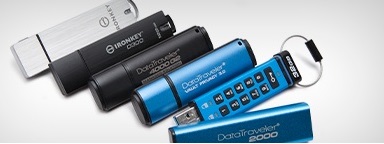
This requires encryption of sensitive data, appointing a Security Officer, cyber security programs and policy adoption.

Kingston IronKey encrypted USBs are a security consideration for organizations of all sizes.

We compare unencrypted and encrypted USB drives and explain how to keep data secure!

Discover why Kingston IronKey is the go-to solution for protecting financial services data.

Learn how Kingston IronKey is securing the military operations’ data.
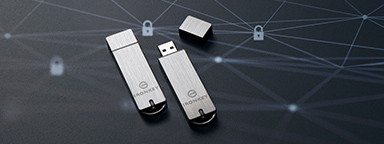
How can you get your organization to use encrypted drives and make them part of your security policy? Here are some tips.

Learn how Kingston IronKey is protecting the telecoms industry's data using encryption.

Encryption is an incredibly helpful option for creatives to protect their clients’ important files.

Kingston IronKey encrypted USBs: a small but important part of any organization’s security strategy.

Kingston IronKey can help mitigate data loss resulting from the rise in lost electronic devices.

In this eBook, we explore how encrypted USB drives have become a key tool in keeping data secure.
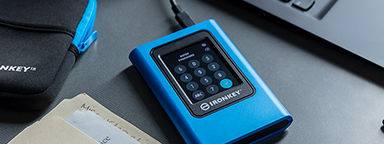
How to use your IronKey Vault Privacy 80 External SSD: set password, connecting to a PC and more.

Organizations are considering data security options to protect against private mobile data breaches.

Discover how Kingston IronKey is protecting the sensitive data of the finance sector.

Here is how Kingston IronKey helped protect the sensitive data of the Energy industry.

We explore our KingstonCognate experts’ thoughts on cyberthreats and cybersecurity challenges.

Software based encryption can be disabled by the user. This can lead to fines and legal fees if the drive is lost.

We explore Tomasz Surdyk's thoughts on how all entities can stay secure in the digitized world.

Don’t plug any USB drives into your computer if you don’t know exactly where they came from.

Protection data on the move with superior hardware-based Advanced Encryption Standard (AES) 256.

What we learned from Kingston’s experts and tech influencers on work-from-home enablement Twitter chat.

There are benefits to using both cloud storage and hardware-based encryption.

We explore the top 12 tips small and medium size enterprises can take to enhance cybersecurity.

We’ve examined several factors using unique research to identify what may impact markets globally in 2022.

2021 has been a year full of challenges and innovations. But what will 2022 bring?
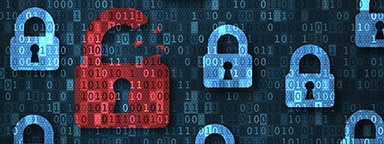
Prof. Sally Eaves shares her thoughts on the SME cybersecurity landscape and the need for education & support.

Bill Mew shares his thoughts how the largest security challenges need commitment from the boardroom.

Rob May shares his thoughts on how close we are to edge computing and the security it requires.

Write your diary digitally with a password protected, cloud backup solution.

The pandemic has increased internet traffic which has placed importance on the role of data centers.

The use of DLP software, VPNs, encrypted SSDs, and USBs will help mitigate some risks of remote working.
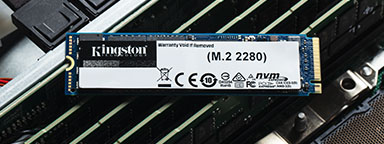
Cameron Crandall of Kingston helps you self-evaluate the need to move to your server storage solution to NVMe.

There are many advantages to using a dedicated hardware encryption processor in USB flash drives.

What will 2021 bring in tech and trends? What do our KingstonCognate members and industry experts predict for the future?

Cyber security and data privacy are everyone’s responsibility. What are the key considerations?

Learn why the future of business depends on SSD-enabled SDS, and how SSD fits into software-defined storage solutions.

Kingston & Matrix42 partnered to give optimal endpoint security solution in multiple sectors to mitigate risks.

Organizations must consider revenue, profit, and risk equally in order to mitigate data security & cyber security risks. In this article, industry expert Bill Mew provides an insight into this topic.
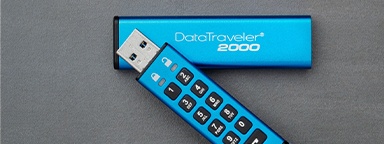
What do industry experts think has changed since the introduction of GDPR?
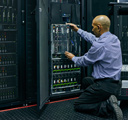
Data centers should be using server SSDs. There are many benefits over client drives and costs have come down.

NVMe is now the standard protocol for SSDs to empower data centers and enterprise environments.
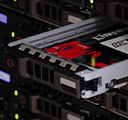
Find out how Hardwareluxx were able to manage the growth of their web traffic using Kingston's DC500M SSD.

SDS hasn’t lived up to its hype but now that NVMe is more affordable the commodity hardware is ready to deliver.

Choosing the right SSD for your server is important since server SSDs are optimized to perform at a predictable latency level while client (desktop/laptop) SSDs are not. These difference result in better uptime and less lag for critical apps and services.

Cloud and on-premise data center managers can learn a lot from supercomputing.

To work from home you need a good workspace for your PC, the right conferencing gear, and a secure connection.
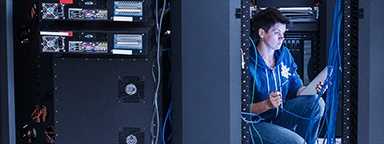
What strategies can organizations use to best secure customer data in a post-GDPR world with the ever-evolving nature of cyber security threats? Kingston pooled the knowledge of some of the UK’s most experienced commentators in cyber security to discuss how data protection has changed since the introduction of GDPR.
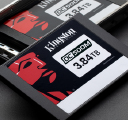
This whitepaper demonstrates how using Kingston Technology’s Data Centre DC500 SSDs can reduce your overall capital and licence costs by 39%.

Data Center 500 Series SSDs (DC500R / DC500M) – Consistency, predictability of Latency (response time) and IOPS (I/Os Per Second) performance.

You already know that remote working is a business enabler. But the challenges posed to your network security and compliance with GDPR are too big to ignore.

How to enable and disable Microsoft’s BitLocker eDrive feature to leverage hardware encryption on your Kingston SSD

The recent WannaCry ransomware made global headlines infecting and alerting everyone from government, healthcare, communication providers, automotive companies to corporations and the general public of their vulnerabilities.
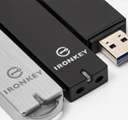
Overall, Kingston / IronKey Encrypted USB Drives prove to be the best solution in reliability, compatibility and security for portable data protection solutions.
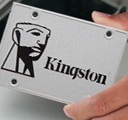
End-to-End Data Protection protects customer’s data as soon as it is transferred by the host system to the SSD, and then from the SSD to the host computer. All Kingston SSDs incorporate this protection.

Some of Kingston and IronKey's Secure USB Flash drives are powered by partners, licensed technology, or services.
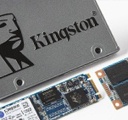
Firmware/hardware PFAIL protection is an highly effective method for preventing data loss in enterprise SSD.

HPC can require massive amounts of data. SSDs consume a fraction of the power of their spinning disk.
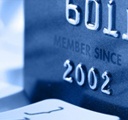
Kingston datacenter SSDs provide excellent resiliency to protect sensitive data in OLTP workloads.
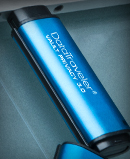
This program offers the options most frequently requested by customers, including serial numbering, dual password and custom logos. With a minimum order of 50 pieces, the program delivers precisely what your organization needs.
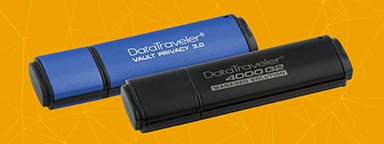
256-bit AES hardware-based XTS block cipher mode encryption is used in DT 4000G2 and DTVP 3.0.
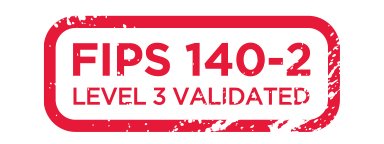
Most IronKey and Kingston secure USB flash drives are FIPS 140-2 Certified.
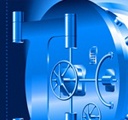
Case in point, Heathrow Airport in London (October 30, 2017) uses Unencrypted USB Drives for its non-cloud storage. Unfortunately, they were not standardized on Encrypted USB drives. Their lack of implementing proper standards in data security / data loss protection with encrypted USB storage has now cost the EU a major breach of confidential and restricted information.
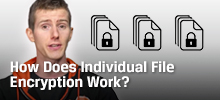
Linus breaks down hardware encryption making sure your files are safe and secure, especially when you're on the go. Make sure your portable storage is also safe and encrypted with Kingston Encrypted USB drives.

Storage can be the most challenging component for VDI performance.
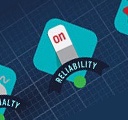
Testing is a cornerstone of our commitment to deliver the most reliable products on the market. We perform rigorous tests on all of our products during each stage of production. These tests ensure quality control throughout the entire manufacturing process.
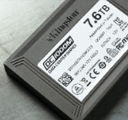
NVMe (Non-Volatile Memory Express) is a communications interface and driver that defines a command set and feature set for PCIe-based SSDs with the goals of increased and efficient performance and interoperability on a broad range of enterprise and client systems.



